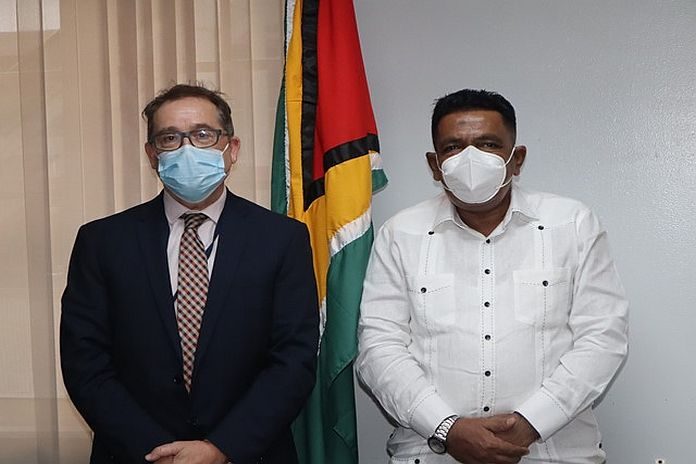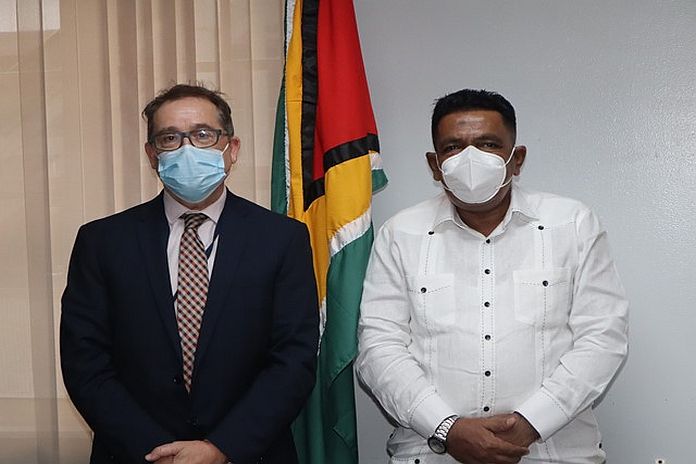Guyana – Canada discusses investment opportunities


By Caribbean News Global contributor
GEORGETOWN, Guyana – Minister of agriculture, Zulfikar Mustapha on Monday received a courtesy call from Canadian High Commissioner to Guyana, H.E. Mark Berman, during which they discussed the many lucrative opportunities in this sector for both local and international investors, according to Department of Public Information, Guyana (DPI).
Guyana’s agriculture sector
“As a government, we’ve made a lot of investment thus far, and we are seeing more persons who would’ve called it a day prior to August 2020, returning to the agriculture sector. We are experiencing increased levels of production and productivity across the sector so I can safely say that the sector is experiencing a noticeable amount of growth. There are a lot of opportunities for both local and international investors. Guyana really depends on agriculture. Oil and gas and the other natural resources that we are blessed with will be gone after some time.
“As a government, one of our goals is to make agriculture less labour intensive. Our human capital will remain a key element to agriculture development but we have to ensure we do agriculture in a more diversified, advanced, and technologically-driven way. This is why we are working to construct more agro-processing facilities to make farmers’ produce more value-added, in addition to securing more markets in the process,” minister Mustapha said.
According to the DPI release, the minister also alluded to the fact that more lands are being made available to match the volume of interest the sector is receiving.
“As investors begin to show interest, we have to make lands available. We have to make the necessary infrastructural adjustments because we are building partnerships. This is why we are currently working to develop the second phase of the Mahaica-Mahaicony-Abary Agriculture Development Authority (MMA-ADA) Scheme.
This is the largest agriculture scheme in the country and Region Five is the largest in terms of production. This is in cash crops, traditional crops like rice and sugar, and cattle. In this year’s budget, we’ve set aside $100 million to start works in that scheme. This will see hundreds or even thousands of acres of land being opened up for agriculture purposes. We will also be building a farm-to-market all-weather road from No. 58 Village, Corentyne to the Canje Creek area,” said, minister Mustapha.
Canada Fund for Local Initiative (CFLI)
According to the DPI release, the High Commissioner said working with the government to promote the vast potential of Guyana’s agriculture sector remains a priority, and that they are working to develop a training capacity-building strategy that Guyana will benefit from.
“Guyana, compared to the rest of the Caribbean, is completely different. You have large areas of arable land and the capacity to produce for much of the Caribbean. We will work with you to promote the agriculture sector. That’s going to be a priority for us. Canada is one of the largest agri-food producers in the world but we also, very much, respect the concept of partnership so that would be the opportunity for Canadian companies to partner with Guyanese companies.
“We will also continue through our Canada Fund for Local Initiative (CFLI) projects to try and push forward as an initial step in the various areas as well as our development program. We’ll continue to build capacity. One of the areas we’re trying to develop is a training capacity-building strategy,” said, Canadian High Commissioner Berman.
CARICOM taskforce
Meanwhile, in discussing his role as chairman of the Ministerial Taskforce for advancing the agriculture agenda in CARICOM, minister Mustapha said the main focus of the task force is to coordinate activities among CARICOM states. He also said the task force is working on having certain barriers to trade among member states removed, DPI reported.
“The main focus of the task force is to coordinate activities among CARICOM states and build capacity to produce a document on food security highlighting the strengths and weaknesses of each member state. Once this is finalised, that document will be submitted to the CARICOM heads of government for implementation. Different countries have different requirements when it comes to trade. Barbados may have different requirements from Trinidad and Tobago.
“There are several barriers in the Caribbean, and more specifically CARICOM. In this task force, we are working to develop common requirements and remove some of those barriers. We are also looking to build capacity within CARICOM. For example, if there are Guyanese investors in Barbados, he/she must have the same opportunities as investors who were born in Barbados. We are really working to develop common markets and common investments,” said, minister Mustapha.
The meeting also discussed large-scale cultivation of corn and soya, cattle and the dairy industry, agri-tourism, rice, and sugar, DPI reported.
Source: caribbeannewsglobal.com


